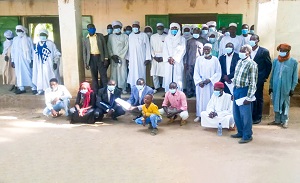Chiefs’ gathering in Chad opens new horizons
 BARO, Chad — In the Guéra region of Chad, some 30 traditional chiefs from the area gathered in the village of Baro to discuss the future of their people. This was one of a dozen such conferences that have been held over the past two years throughout the country by the Bahá’í community in collaboration with traditional leaders.
BARO, Chad — In the Guéra region of Chad, some 30 traditional chiefs from the area gathered in the village of Baro to discuss the future of their people. This was one of a dozen such conferences that have been held over the past two years throughout the country by the Bahá’í community in collaboration with traditional leaders.
“Many chiefs have expressed a desire to learn more about the Bahá’í community-building activities that are bringing people in their villages together to address different social issues,” explains Prime Tchompaare, a member of the Bahá’í Spiritual Assembly of Chad.
The conference itself provided an example of how spiritual principles are essential to discussions on progress. One of the participating chiefs stated: “Unity, religious harmony, love, service to society—the idea of looking at these themes as the starting point for finding solutions to our challenges really allows us to see things we could not see before.”
Another participant described the significance of the conference, stating: “Although we have always led our communities based on our cultural heritage, this unique gathering is allowing us to reflect very deeply on our role in advocating unity and peace and to reflect on the education of our children. These kinds of spaces can help us to be at the vanguard of addressing the aspirations of our community.”
The consultations at the conference allowed the chiefs to examine many different societal issues, while drawing in part from the experience of the Bahá’ís of Chad in their community-building efforts.
The moral education of children and youth was one of the themes they explored. At the gathering, Mr. Tchompaare highlighted aspects of the Bahá’í educational programs that develop capacities for service, stating: “Through this process, youth develop the ability to reflect together on the needs of their communities, they join others in serving their locality, and they see new possibilities. They want to stay longer in their communities in order to contribute to long-term prosperity.”
One of the chiefs at the conference observed that this educational process holds great potential, especially for young people, stating: “It can assist in addressing many of the ills we suffer, such as tensions between generations as well as rural exodus. As chiefs, we have long had the custom of gathering young people to teach them our traditions and religious teachings. Now we are thinking about how this custom can be adapted to further help children develop what they need for current times and embrace the world with greater openness, while remaining connected to their heritage.”
The evolution of culture was another theme the chiefs discussed at the gathering. Discussions highlighted the need for a deeper examination of some customary practices that may act as barriers to greater participation of women in community affairs.
Another area of great interest to the chiefs was approaches conducive to solving disagreements among people. “In our villages, there is frequent tension between crop farmers and livestock breeders over land,” said one of the chiefs.
“I believe this can only be resolved,” he continued, “through the kind of consultation, tolerance, and prayerful atmosphere that we see in this gathering. The idea of fostering the devotional life of a community, involving all inhabitants, is very inspiring. It attracts the hearts and can provide a path toward greater harmony.”
At the conclusion of the gathering, the chiefs made plans to hold similar meetings of their own in their respective localities, exploring the same themes with community members.
Source: news.bahai.org/

